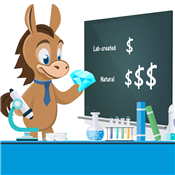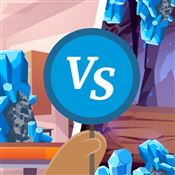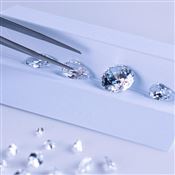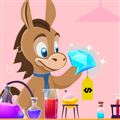Can a Jeweler Tell if a Diamond is Lab Created?
Lab diamonds and natural diamonds are every bit the same stones. But can a jeweler tell if a diamond is lab-created?
 |
- Can a Jeweler Tell if a Diamond is Lab-Created?
- Can Lab Diamonds Pass a Diamond Tester?
- Why Do Some Lab Diamonds Test as Moissanites?
- Are Lab-Grown Diamonds Real?
- Lab Diamond vs. Natural Diamond
- How Do You Tell for Sure if It's a Lab-Grown Diamond?
- Are Lab-Created Diamonds Laser Inscribed?
- Lab Diamond vs. Cubic Zirconia vs. Moissanite
- Pros and Cons
- Best Lab-Grown Diamonds
Excited about the prospect of owning a real but cheaper diamond? Then you've probably heard lab diamonds are real diamonds. You might even be considering purchasing one.
But how exactly are they real, and can a jeweler tell the difference?
Here is the lowdown to identifying lab-created diamonds.
Can a Jeweler Tell if a Diamond is Lab-Created?
It's impossible for jewelers to detect lab diamonds with the naked eye. Even tools such as microscopes and loupes can't tell lab diamonds and natural diamonds apart.
That's unless the stone has a laser inscription stating it's lab-grown. We'll discuss this more later.
But jewelers are starting to invest in cutting-edge technology to detect lab-grown diamonds. Like the DiaTrue machine from OGI Systems, for example. But not all jewelers have these machines since they can be super-expensive.
It's a different case for diamond simulants like cubic zirconia and moissanite. These are what people usually mean when they say "fake diamonds." Jewelers can identify them by weighing or looking at these stones.
Can Lab Diamonds Pass a Diamond Tester?
Lab diamonds will pass a diamond tester. Like their natural counterparts, lab diamonds are also made of pure carbon. They have the same electrical and thermal conductivity, which diamond testers use to distinguish diamonds.
Different gemstones conduct heat and electricity in different ways. Diamonds conduct heat well and do not conduct electricity. If a stone behaves the same way, it'll test as a diamond.
But there might be instances when lab diamonds test as moissanite.
Why Do Some Lab Diamonds Test as Moissanites?
Like diamonds, moissanite is a good conductor of heat. But unlike diamonds, these stones conduct electricity.
Scientists use different methods to grow lab diamonds. And some of these can result in trace amounts of boron, which makes the lab diamond electrically conductive. Since that's similar to moissanite, when a diamond tester picks up on this, they will return a moissanite result.
But diamonds and moissanite have completely different physical properties. So you don't need to worry about moissanite being passed off as a lab diamond.
Are Lab-Grown Diamonds Real?
Lab diamonds are real diamonds. They share the same physical and chemical properties as natural diamonds. In terms of sparkle and durability, they're virtually the same stones.
That's why jewelers and diamond testers can't detect them.
Lab Diamond vs. Natural Diamond
The only difference between lab-grown and natural diamonds is their origin. Natural diamonds form beneath the earth. Meanwhile, man-made diamonds are grown inside laboratories.
Because they're mass-produced, lab diamonds can be 60%-70% cheaper than natural diamonds. But this also means that lab diamonds have little to no resale value. Since they're not valued for rarity.
How Do You Tell for Sure if It's a Lab-Grown Diamond?
The only way to be 100% sure of a diamond's origin is by sending it to specialized labs like GIA and IGI.
These labs have the right equipment to detect lab-created diamonds. They will use these to check for features that distinguish lab diamonds:
- Fluorescence and phosphorescence
When exposed to UV light, lab diamonds glow (fluoresce) yellow, greenish-blue, or orange. This glow (phosphoresce) remains for a while even after the UV light has been removed. Natural diamonds fluoresce blue and don't phosphoresce. - Growth patterns
Growth patterns tell us how a diamond is formed. Natural diamonds take millions of years to form. So they should show different growth patterns from a lab diamond made in just weeks. - Inclusions
Lab diamonds and natural diamonds may differ in their inclusions. Metallic inclusions occur only in lab diamonds. - Nitrogen
Most natural diamonds have small traces of nitrogen, while lab diamonds usually don't.
Are Lab-Created Diamonds Laser Inscribed?
Both natural diamonds and lab diamonds can be inscribed. But lab diamonds have distinct laser inscriptions that identify them as lab-made. Jewelers can view this inscription through their loupes or microscopes. This is the best way to tell a lab diamond without sending it off for testing.
The inscription on a lab diamond typically contains a word such as "Created" and "Lab Grown" (often shortened to "LG"). Also, a certificate number that is searchable on the lab's website.
But not all lab-grown diamonds are inscribed. So, laser inscriptions are not foolproof indicators of a stone's origin.
Lab Diamond vs. Cubic Zirconia vs. Moissanite
Here's how lab diamonds compare with two of the most popular diamond simulants.
- Cubic zirconia is a very cheap, man-made stone that looks like a diamond. They're always white and flawless. Compared to a diamond's white sparkles, these stones shine in rainbow colors. But they get chipped and cloudy from daily wear. So they're often treated as temporary and even disposable stones.
Learn more about the differences between diamonds and cubic zirconia.
- Moissanite is a natural gemstone found in meteorites. But because they're so rare, most moissanite today are also lab-grown. They also look very similar and are almost as durable as diamonds. But they're shinier with their rainbow sparkles, so you also get a very sparkly ring.
Lab Diamonds Pros and Cons
Pros
- Real but cheaper diamonds
- Less likely to have visible flaws
- More ethical and eco-friendly origin
- More affordable colored diamond options
- Cheaper to insure
Cons
- No resale value
- Not rare
- Unfavorable opinion on lab diamonds
- Fewer insurance providers
Best Lab-Grown Diamonds
Curious about where you can buy lab-created diamonds? We've rounded up some of the best places for you.
- James Allen
James Allen tops online diamond retailers for value, selection, and customer service. But it doesn't have the lowest prices. But with over 50,000 loose lab diamond offerings, they're unrivaled in terms of customization and selection. - Clean Origin
For the best prices, head to Clean Origin. They don't carry as many loose stones. But Clean Origin offers better prices. Their lab-created 1.07 carat D color VVS2 diamond retails at $1,830 while a stone of the exact same quality from James Allen costs $2,570. Plus, their diamonds are hand-picked and guaranteed to be visually flawless. - Blue Nile
Blue Nile started selling lab-grown diamonds recently. It now allows you to design your own custom engagement ring with high-quality lab-grown diamonds.
Bottom Line
Lab diamonds and natural diamonds have the exact same properties. Even jewelers can't tell if a diamond is lab-created without some high-tech machines.
And while there's a variety of tests to detect lab-grown diamonds, they vary in cost and reliability.
It's best to buy from trusted retailers to save yourself from the hassle of identifying lab diamonds.
Write to Chesca Santiago at feedback@creditdonkey.com. Follow us on Twitter and Facebook for our latest posts.
Note: This website is made possible through financial relationships with some of the products and services mentioned on this site. We may receive compensation if you shop through links in our content. You do not have to use our links, but you help support CreditDonkey if you do.
|
|
|




